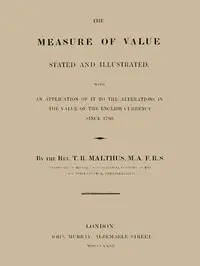"An Essay on the Principle of Population" by T. R. (Thomas Robert) Malthus is a scientific work from the late 1700s that examines how population size and the availability of resources interact, suggesting that populations grow much faster than the food supply. Malthus argued that this difference leads to unavoidable problems like hunger and sickness, which naturally control population growth. The writing looks into how these ideas might affect society's future and whether or not human life can truly get better. The essay begins with Malthus thinking about a discussion on how to improve society, which leads him to ponder an important question about whether people can actually progress. He points out that many people think society is getting better all the time, but he thinks this idea ignores important facts about how populations grow. Malthus goes over the "natural" limits on population, such as famine and disease, which happen when there isn't enough food for everyone, and stresses that it's important to understand these forces when talking about making society better. Malthus admits his findings might sound grim, but he insists they come from simply observing the world as it is, without any personal feelings getting in the way.

An Essay on the Principle of Population
By T. R. (Thomas Robert) Malthus
A stark warning emerges, foretelling a future where unchecked population growth clashes with limited resources, leading to famine, disease, and a battle for survival.
Summary
About the AuthorThomas Robert Malthus was an English economist, cleric, and scholar influential in the fields of political economy and demography.
Thomas Robert Malthus was an English economist, cleric, and scholar influential in the fields of political economy and demography.
More Like This
Explore books similar to the one you're viewing

An Inquiry into the Nature and Progress of Rent, and the Principles by Which It is Regulated
By T. R. (Thomas Robert) Malthus

The Malthusian Handbook Designed to Induce Married People to Limit Their Families Within Their Means.
By Anonymous

Life and Writings of Thomas R. Malthus
By Charles R. (Charles Robert) Drysdale

Owen's Moral Physiology; or, A Brief and Plain Treatise on the Population Question
By Robert Dale Owen

Birth Control: A Statement of Christian Doctrine against the Neo-Malthusians
By Halliday Sutherland

Fruits of Philosophy: A Treatise on the Population Question
By Charles Knowlton

Malthus and his work
By James Bonar
More by This Author
Discover other books written by the same author

The Grounds of an Opinion on the Policy of Restricting the Importation of Foreign Corn Intended as an appendix to "Observations on the corn laws"
By T. R. (Thomas Robert) Malthus

The Measure of Value Stated and Illustrated With an Application of it to the Alterations in the Value of the English Currency since 1790
By T. R. (Thomas Robert) Malthus

Definitions in Political Economy, Preceded by an Inquiry Into the Rules which Ought to Guide Political Economists in the Definition and Use of Their Terms; with Remarks on the Deviation from These Rules in Their Writings
By T. R. (Thomas Robert) Malthus

An Inquiry into the Nature and Progress of Rent, and the Principles by Which It is Regulated
By T. R. (Thomas Robert) Malthus

Observations on the Effects of the Corn Laws, and of a Rise or Fall in the Price of Corn on the Agriculture and General Wealth of the Country
By T. R. (Thomas Robert) Malthus

An Essay on the Principle of Population
By T. R. (Thomas Robert) Malthus
Related by Category
Discover books in the same genre or category

A Rational Wages System Some Notes on the Method of Paying the Worker a Reward for Efficiency in Addition to Wages
By Henry Atkinson

A Short View of the Laws Now Subsisting with Respect to the Powers of the East India Company To Borrow Money under their Seal, and to Incur Debts in the Course of their Trade, by the Purchase of Goods on Credit, and by Freighting Ships or other Mercantile Transactions
By William Pulteney

Salvador of the Twentieth Century
By Percy F. (Percy Falcke) Martin

A Journal of a Visit of Three Days to Skibbereen, and Its Neighbourhood
By Elihu Burritt

Harmonies of Political Economy Translated from the Third French Edition, with a Notice of the Life and Writings of the Author
By Frédéric Bastiat

Unto This Last, and Other Essays on Political Economy
By John Ruskin
Account Required
You need an account to complete this action.
